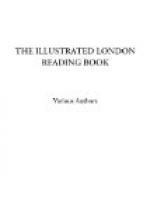As a warrior in his scorn!
Dash the red rowel in the steed!
Spur, laggards, while ye may!
St. Hubert’s staff to a stripling reed,
He dies no death to-day!
“Forward!” nay, waste not idle breath,
Gallants, ye win no greenwood wreath;
His antlers dance above the heath,
Like chieftain’s plumed helm;
Right onward for the western peak,
Where breaks the sky in one white streak,
See, Isabel, in bold relief,
To Fancy’s eye, Glenartney’s chief,
Guarding his ancient realm.
So motionless, so noiseless there,
His foot on rock, his head in air,
Like sculptor’s breathing stone:
Then, snorting from the rapid race,
Snuffs the free air a moment’s space,
Glares grimly on the baffled chase,
And seeks the covert lone.
Hunting has been a favourite sport in Britain for many centuries. Dyonisius (B.C. 50) tells us that the North Britons lived, in great part, upon the food they procured by hunting. Strabo states that the dogs bred in Britain were highly esteemed on the Continent, on account of their excellent qualities for hunting; and Caesar tells us that venison constituted a great portion of the food of the Britons, who did not eat hares. Hunting was also in ancient times a Royal and noble sport: Alfred the Great hunted at twelve years of age; Athelstan, Edward the Confessor, Harold, William the Conqueror, William Rufus, and John were all good huntsmen; Edward II. reduced hunting to a science, and established rules for its practice; Henry IV. appointed a master of the game; Edward III. hunted with sixty couples of stag-hounds; Elizabeth was a famous huntswoman; and James I. preferred hunting to hawking or shooting. The Bishops and Abbots of the middle ages hunted with great state. Ladies also joined in the chase from the earliest times; and a lady’s hunting-dress in the fifteenth century scarcely differed from the riding-habit of the present day.
SIR WALTER SCOTT.
[Illustration: THE DEER-STALKER’S RETURN.]
* * * * *
JOHN BUNYAN AND HIS WIFE.
[Illustration: Letter E.]
Elizabeth his wife, actuated by his undaunted spirit, applied to the House of Lords for his release; and, according to her relation, she was told, “they could do nothing; but that his releasement was committed to the Judges at the next assizes.” The Judges were Sir Matthew Hale and Mr. Justice Twisden; and a remarkable contrast appeared between the well-known meekness of the one, and fury of the other. Elizabeth came before them, and, stating her husband’s case, prayed for justice: “Judge Twisden,” says John Bunyan, “snapt her up, and angrily told her that I was a convicted person, and could not be released unless I would promise to preach no




